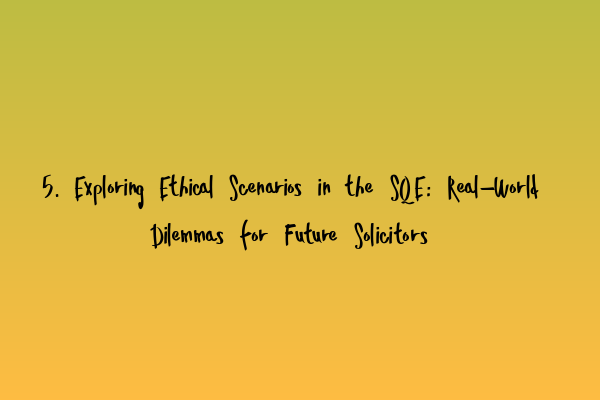Exploring Ethical Scenarios in the SQE: Real-World Dilemmas for Future Solicitors
As future solicitors prepare for the Solicitors Qualifying Examination (SQE), it is crucial for them to not only have a solid understanding of the law but also possess strong ethical reasoning skills. The SQE is designed to test both legal knowledge and ethical decision-making, ensuring that solicitors entering the legal profession are equipped to handle real-world dilemmas with integrity and professionalism.
In this blog post, we will delve into five ethical scenarios that aspiring solicitors may encounter during the SQE and highlight the importance of ethical considerations in legal practice. Let’s explore these dilemma-filled situations and discover how they can shape the decision-making abilities of future solicitors.
1. Conflict of Interest
One ethical scenario that commonly arises in legal practice is the conflict of interest. This occurs when a solicitor’s personal, financial, or professional interests conflict with the duty of loyalty and confidentiality owed to a client. For instance, imagine a solicitor who is representing a client in a personal injury case while simultaneously having a financial interest in a company being sued by the same client. How should the solicitor navigate this situation?
Dealing with conflicts of interest requires solicitors to carefully assess the potential risks and take appropriate steps to protect their clients’ interests. The SRA Code of Conduct provides guidance on managing conflicts of interest, emphasizing the importance of transparency, impartiality, and avoiding any compromise on client confidentiality.
2. Confidentiality and Privilege
Confidentiality and privilege are fundamental principles in the solicitor-client relationship. Solicitors are entrusted with sensitive information by their clients and must ensure that it is kept confidential. However, ethical dilemmas can arise when solicitors come across information that may require disclosure under the law.
For instance, consider a situation where a client discloses their intention to commit a crime. How should a solicitor balance their duty of confidentiality with the potential harm that may result? Understanding how to apply legal and ethical principles, such as the “crime-fraud exception,” is critical in making the right decision in such scenarios.
3. Compromising Representations
Solicitors have a duty to act in the best interests of their clients. However, ethical dilemmas can emerge when a client’s instructions require a solicitor to act in a way that compromises their professional integrity or the administration of justice.
For example, imagine a client instructing their solicitor to present false evidence in court. This puts the solicitor in a difficult position, as they must balance their duty to represent their client effectively while upholding their duty to the court. The ability to navigate such situations ethically is crucial in maintaining the trust and integrity of the legal profession.
4. Financial and Cost Considerations
One ethical scenario that solicitors often face relates to financial and cost considerations. Balancing the need to provide quality legal services with the costs involved can present dilemmas, particularly when costs may impinge on access to justice.
For instance, imagine a solicitor representing a client who is unable to afford legal fees but has a valid and significant claim. The solicitor must decide whether to proceed with the case at a reduced fee or pro bono to ensure access to justice. Striking the right balance between financial considerations and the public interest is a challenge that future solicitors must be prepared to face.
5. Social Responsibility and Implicit Bias
Implicit bias is a concept that refers to the unconscious attitudes and stereotypes that individuals may hold. Recognizing and addressing implicit biases is vital to ensure fair and unbiased treatment of clients. Ethical dilemmas can arise when implicit biases inadvertently influence decision-making.
For example, consider a solicitor who holds biases against certain ethnic or social groups. These biases may impact their interactions with clients and can lead to unfair treatment or ineffective advocacy. Aspiring solicitors must actively engage in enhancing their cultural competence and tackling implicit biases to ensure equal representation and justice for all.
By exploring ethical scenarios like the ones mentioned above, future solicitors can develop the necessary skills to navigate complex dilemmas professionally and ethically. It is essential to remember that legal practice is not solely about knowledge of the law but also about making sound decisions that uphold the principles of justice and integrity.
To further prepare for the SQE and enhance your legal knowledge and skills, explore our related articles:
- SQE 1 Practice Exam Questions
- SQE 1 Practice Mocks FLK1 FLK2
- SQE 2 Preparation Courses
- SQE 1 Preparation Courses
- SRA SQE Exam Dates
Our comprehensive resources and courses will equip you with the knowledge and skills necessary to excel in the SQE and become an ethical and proficient solicitor. Good luck with your preparations!
